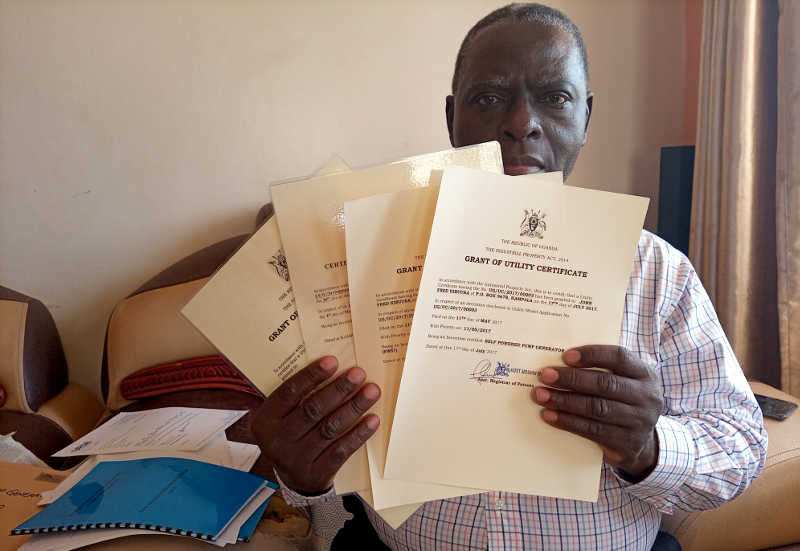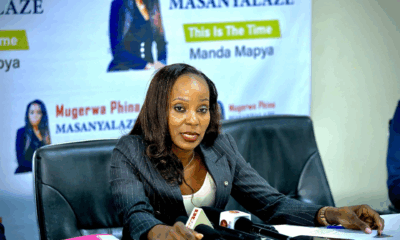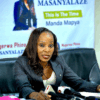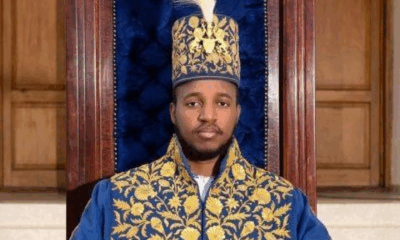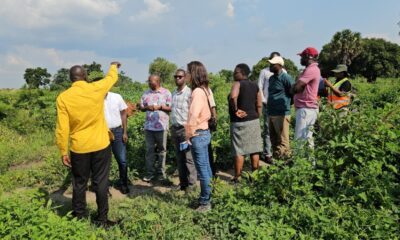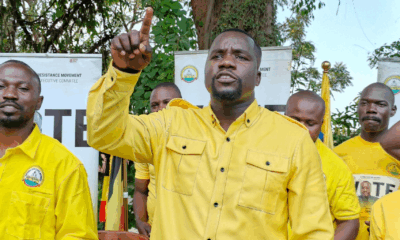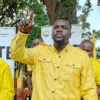News
Here is Uganda’s biggest scientific innovator

John Fred Kibuuka currently holds the trophy as the per with the highest number of patents
Late last year I set out to find the officially-recognised most innovative persons in Uganda. I knew I would find this information with the Uganda Registration Services Bureau (URSB), the government body that is charged with registering and protecting patents, which are certificates given to someone or a company to recognise their unique scientific creations, a section of a broader category known as Intellectual Property Rights (IPS), or creations of the mind.
I filed an application for this information, upon paying a certain administrative fee. After a few weeks of waiting, and reminding the officials, I considered myself fortunate to get positive feedback from officials of the bureau.
I was indeed fortunate, because as I later discovered, URSB officials had consulted with the people I was looking for to seek their permission to share their contacts with a journalist, to which they agreed.
I’d met many brilliant scientists in my 20 years of journalism, and I was anxious to find who beat them all and perhaps what was the application of his or her innovation in changing the lives of Ugandans.
My URSB application returned with a couple of names. Top on the list was John Fred Kibuuka.
A quick google search about ‘John Fred Kibuuka’, initially returned a few pages, but none of them hinted on inventing anything. A refined search returned fewer pages but with a 2019 Youtube story by NTV that described one of Kibuuka’s innovations.
Fortunately, I had a telephone contact supplied by URSB. I rang him up and we agreed to meet for an interview at his residence in Najjanankumbi, Kampala not far away from Freedom City along Entebbe road.
Knowing how innovations in other countries had transformed people into super rich if not very comfortable lifestyles, I braced myself to meet a well off man with some form of government protection.
But the directions he gave me led me to an unmarked road leading to a gated but dusty and noisy neighbourhood.
A soft-spoken dark-skinned gentleman around 60-something years, ushered me into the gate. He told me he’s the one I’d been talking to. I was glad he had accepted to meet me. My first impression was that his mid-sized iron-sheet roofed house and the general environment in which Uganda’s most decorated scientist lived, betrayed President Museveni’s commitment to prioritise scientists.
But I put that on the side of my mind and focused on discovering who Kibuuka was and what had he brought to the world.
John Fred Kibuuka, he told me, he is a Researcher and Inventor, who is involved in designs and Technology development. He graduated from The Uganda Technical College Kyambogo (Currently Kyambogo University) in the seventies, where he specialised in the field of Electrical Engineering, before he got employed in different institutions such as The Ministry of Defence Construction Department, Gayaza High School, The East African Examinations Council which later became UNEB, The International Television Sales and Services which was a subsidiary Company of Ministry of Information and Broadcasting,The Provincial Offices Church of Uganda, The African Evangelistic Enterprises (AEE) before he went into private practice. For the larger part of his working life, he has been hustling for jobs here and there to sustain his family.
Kibuuka did not set out to be the champion of innovators in Uganda. But his ingenuity, relentless search for solutions to pervasive problems affecting Ugandans, and God’s blessing have inspired him to spend sleepless nights, personal meagre savings to register four patents with URSB, with about nine still in the pipeline.
As he told me, his innovations have been motivated by challenges and guided by the ALMIGHTY GOD.
“I look at situations that are problematic and I seek to provide solutions. My philosophy is; See an opportunity in the face of the storm.
“Whenever a major problem emerges, of course I get alarmed like many people. But I always ask myself, what good can I make out of it. Every time this calamity strikes, I get down on my knees and beg the ALMIGHTY to give me the wisdom to overcome it and get something good out of it,” says Kibuuka.
“I am motivated by the need to find solutions to problems that affect our people. But I want to focus on research with the view that after I have developed the product, some investor or entrepreneur can come up, we agree on sharing the royalties, then he takes it up and mass produces it.
Out of prayer, ingenuity, great sacrifice, Kibuuka has secured four patents for four machines with multiple functionalities ranging from fire fighting, electricity generation, water pumping and irrigation and aerobics.
Of course his electrical engineering background, hard work, a burning passion to bring about positive changes in society have been key pillars in his journey so far.
In our three hour interview, one could notice his firm grounding in principles of electrical engineering, such as making accurate calculations regarding speed and energy, have perfectly combined with divine intervention to result into many useful products.
The amazing fire quencher
Kibuuka’s most recent innovation is a mobile fire fighting machine. He baptised it Joshua TFM; Joshua being the name of his last born son, while TFM stands for Tripple Function Machine.
Unlike his previous inventions, the Joshua TFM machine is an electric-powered machine the size of work desk, with the water tank capacity of 200 litres and pressure that can push the water up a distance of 80 feet.
Kibuuka was inspired to design a fire-fighting machine, by the fateful incident of the fire that gutted Manya Secondary School in Rakai district of Southern Uganda, in September of 2018. Kibuuka recalls that the fire, which killed more than ten children, got him so concerned that he wanted to prevent similar incidents from happening again.
He recalls that: “When I saw this fire, I asked myself, how long shall this continue without being checked. Since then, I was deeply bothered and I asked GOD to give me wisdom to find a solution to this challenge. So I started to develop a fire-fighting machine which can be used to fight fire.”
The moment he set his thoughts on his objective, Kibuuka says, he would get intuitive flashes of wisdom which he prefers to call revelations, usually at night when everyone in the house is asleep.
The busiest moment
“I tell people that my day dawns twice. It dawns like for the rest of the people in the morning. And again, it dawns for me the second time at 11:30PM. As I say good night to my people, I stay behind to work on my concepts until about 3:30 or 4AM. At such a time, I don’t expect anyone to call me. This quiet time helps me to concentrate. That is how I have been doing all my research.”
Testing the Joshua TFM
When he was done with designing his fire-fighting machine, Kibuuka explains that, he approached the Uganda Police Fire Brigade Directorate to evaluate its effectiveness.
He says during the demonstration, they were pleasantly shocked by the sheer power with which it would push the water.
“They told me it was appropriate for controlling starting fires and hindering its spread.”
With its immense power, coupled with the fact that it can be moved around through corridors and narrow streets where the fire-brigade engine may not reach, makes the Joshua TFM fire quencher a handy stand-by tool for fighting fires not just for schools, but also for other businesses whenever a fire outbreak erupts.
Getting certified
The process of getting the machine recognised as an innovation by a team of experts of the Uganda Registration Services Bureau wasn’t an easy task, although it was familiar, given earlier experience he had gained from patenting technologies that we shall explore later on.
He explains that the URSB team which comprises engineers, lawyers, Scientists and academics, require detailed specifications with drawings and thorough explanations about the functionality of that specific innovation which has been submitted.
It is however the investment, including financial resources and time that he puts into the various innovations that make him the hero he really is.
As he explained, designing the machines for which he has received patents has been a personal struggle of having to sacrifice money and other resources for his family in order to come up with something beneficial to the wider society.
“As a researcher, I concentrate on thinking and putting my designs on paper. I do not have a workshop where I can shape or weld the various parts that I need. Indeed, there are parts that cost millions of shillings that I have to purchase, re-configure to get what I need. This takes a lot of money that I have to sacrifice from my meagre savings,” Kibuuka says.
One of Kibuuka’s greatest regrets however, is the fact that he has not been helped by relevant Government bodies charged with promoting research and nurturing products of scientific discoveries by Ugandans. He says he tried several times to knock at doors at the Ministry of Science and Technology but got nothing.
Kibuuka says he remains hopeful that if the President can get to know about his plight, he could perhaps extend some financial or material support to ease his work of putting together his innovations, testing them as well as source the required parts from other parts of the world.
He says: “I am appealing to our dear President Museveni, who has repeatedly stated that he supports scientists, to come to our rescue and tell us which channels we can use to be assisted. As Kibuuka, I have tried several times to access any form of assistance in my endeavours, but I have failed.”
Up to this point, you probably agree with me that Kibuuka’s level of patriotism is unrivalled. From what inspires him, to the personal sacrifices he makes, there’s no doubting the fact that he deserves to be given a helping hand to help him realise his efforts and ultimately serve the purpose for this they were made – solving Ugandan problems. However, he says that after many failed attempts to secure the support of the Government, he could be open to partnerships from other countries, even if this may mean that the initial beneficiaries of his technologies are not Ugandan.
In the second part of our Series on Kibuuka’s innovation, we shall bring explore in detail the three other innovations.
Comments



